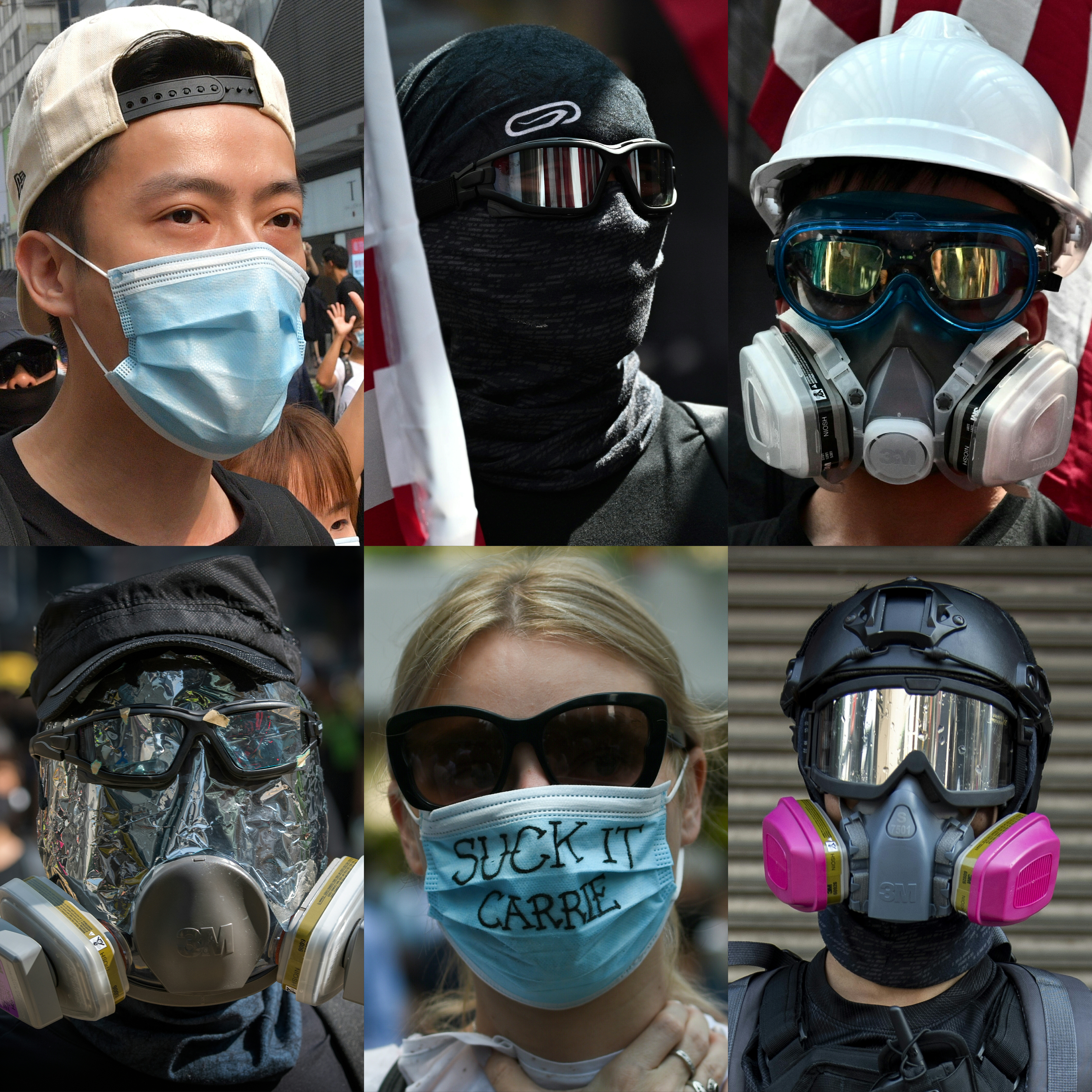
(COMBO) This combination of pictures created on October 04, 2019 shows files pictures of protesters wearing face masks during demonstrations in Hong Kong. Hong Kong’s leader invoked colonial-era emergency powers on October 4, 2019 to ban protesters wearing face masks, but the move aimed at quelling months of unrest sparked immediate fresh rallies and vows to defy the new law. – Chief executive Carrie Lam said she had made the order under the Emergency Regulations Ordinances, a sweeping provision that grants her the ability to bypass the legislature and make any law during a time of emergency or public danger. (Photos by AFP)
HONG KONG — Hong Kong’s mass transit rail system was suspended and dozens of banks and shopping malls closed on Saturday after a ban on pro-democracy protesters wearing face masks came into effect, sparking widespread anger and violent clashes.
The ban, imposed under emergency powers not used in more than half a century, was aimed at quelling nearly four months of unrest but instead triggered mass protests and vows of defiance, with a 14-year-old boy reportedly shot and wounded.
Spontaneous rallies broke out across Hong Kong after Chief Executive Carrie Lam announced the emergency law on Friday, with large crowds of office workers initially blocking roads in the heart of the Central commercial district.
Demonstrators later vandalized subway stations, started street fires and smashed the windows of pro-China businesses as clashes erupted throughout the evening. Police used tear gas in multiple locations to disperse protesters who had taken over roads.
“The government doesn’t listen to us. So we are upping our game,” said 32-year-old protester Nathalie, as hardcore demonstrators trashed the MTR station in the previously calm neighbourhood of Tseung Kwan O.
In the northern district of Yuen Long, a police officer opened fire when he was surrounded in his car and attacked by protesters, a petrol bomb exploding at his feet.
“A large group of rioters attacked a plainclothes police officer in Yuen Long district. The police officer fell onto the ground and was beaten up by the group. Facing serious threat to his life, he fired one shot in self-defense,” police said in a statement.
Also in Yuen Long, a teenage boy was shot and wounded by a live round, the South China Morning Post reported, citing a medical source. It was unclear if that round was linked to the plainclothes officer who opened fire.
The entire subway network was suspended, leaving protesters, locals and Friday night revelers stranded.
As the city awoke on Saturday, the rail network remained out of action — including the crucial airport line — with the rail operator saying it would assess damage to stations before deciding when to reopen lines.
Shopping malls were closed, supermarket chains said they would not open and many mainland Chinese banks, which were targeted in Friday night’s violence, stayed shuttered.
Fresh protests were expected later in the day and the police urged members of the public to stay alert.
‘Extremely necessary’
Beijing described the ban — which uses a colonial-era provision that allows the government to bypass the legislature and make any law during a time of emergency or public danger — as “extremely necessary”.
“The current chaos in Hong Kong cannot continue indefinitely,” Yang Guang, spokesman for the Hong Kong and Macao Affairs Office of China’s central government, said in a statement.
“An important moment has come for stopping the violence with a clearer attitude and more effective measures,” he added.
Critics said Lam’s move was a major step towards authoritarianism for Hong Kong, which has been governed by China under a “one country, two systems” framework since British colonial rule ended in 1997.
“She’s like a queen now,” said a 19-year-old student who identified himself only as JC.
Prominent democracy activist Joshua Wong said the law “marks the beginning of the end of Hong Kong”.
In the United States, the Congressional-Executive Commission on China, at which Wong testified last month, said that using the emergency powers “will not address the grievances underlying four months of protests”.
Avoiding identification
Hong Kong’s protests were ignited by a now-scrapped plan to allow extraditions to the mainland, which fueled fears of an erosion of liberties promised under “one country, two systems”.
After Beijing and local leaders took a hard line, the demonstrations snowballed into a wider movement calling for more democratic freedoms and police accountability.
Protesters have used face masks to avoid identification and respirators to protect themselves from tear gas.
The ban came after the worst violence of the year, when China celebrated 70 years of Communist Party rule on Tuesday. During those clashes, an officer shot and wounded a teenager — the first such shooting since the demonstrations began.
The new law threatens anyone wearing masks at protests with up to one year in prison.
For one of those at Friday’s march, the ban would not solve the city’s woes.
“Youngsters are risking their lives,” a 34-year-old office worker wearing a surgical mask, who gave her first name as Mary, told AFP.
“They don’t mind being jailed for 10 years, so wearing masks is not a problem.” /muf

